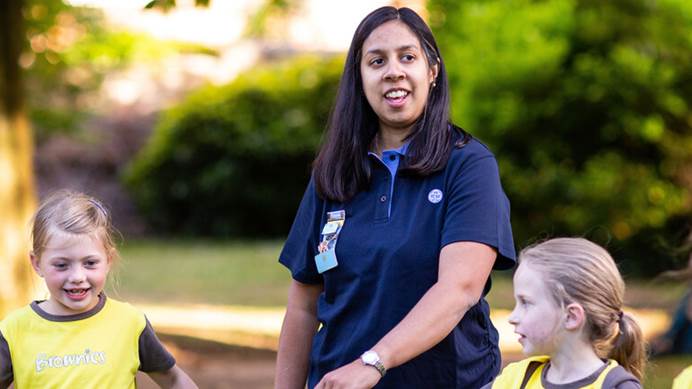Celebrating religious festivals
Our faith inclusion specialist writes about how to mark occasions meaningfully with your unit
There are lots of festivals, celebrations and important days that different communities and cultures mark throughout the year.
All over the UK we have communities with so many wonderful cultures, faiths and traditions. I’m a great believer that within guiding, it’s our privilege to help learn, celebrate and understand these in a meaningful way which isn’t tokenistic, stereotypical or offensive.
It’s easy to look at the calendar and see major festivals as a welcome break and an easy night and not engage meaningfully with the festivity, tradition or local events.
Equally, it’s easy just to stick to the celebrations we know because they’re easy and we’ve got 20 years’ worth of activities stashed away. It’s a challenge not to tokenise or represent cultures and faiths in simplistic and stereotypical ways. But it’s a challenge we need to take on.
But then comes the second big problem, which one to celebrate? There are so many opportunities throughout the year!
So perhaps an easier question to start with is why are we exploring particular holidays, traditions and festivals? And how is it possible for us to meaningfully explore and celebrate them and not exclude anyone from them? Here are some tips to help all of us enjoy the wonderful and diverse celebrations out there.
- Keep it girl-led: I love that we’re girl-led. Ask young members what they would like to celebrate. Put together a list of as many festivals and celebrations you can find with a bit of explanation about each one and let them decide. And of course we have our festivals badges for Diwali, Eid, Easter, Hannukah, Lunar New Year and Christmas. Ask young members what celebrations are important to them and their families, which leads me to top tip number two...
- Involve other people: But it’s important to be sensitive with this; not all members of a community will want to share their experiences. Councils often produce resources for young families to explore and celebrate so maximise on that. Or you could ask a local religious leader to come and talk to the unit and do some activities. Again, not every leader will want to do this, so be sure to ask them sensitively and with this in mind. If they aren’t able to help or you don’t have any nearby, check in with other volunteers or commissioners in your area to see if they've done anything similar, or have any advice. Remember, like with any external visitor to a meeting, complete the external visitors checklist. Find the checklist, and more information, on our Visitors to your meeting webpage.
- Do some in-depth research and planning: Go a bit deeper and consider what might be cultural appropriation or stereotyping. Take some time to research what festivals and celebrations mean and I promise you, you’ll be inspired to do something amazing with your unit. You could even ask your young members to do some research themselves and come up with some ideas of how to celebrate as a unit and see what they would like to lead themselves. This might be a good opportunity to explore what cultural appropriation looks like too and how we can avoid it. Our Inclusion unit meeting activities are another way to explore this and look at themes like allyship.
- Make it a theme for a few weeks: It’s easy to get caught up with festivals for that one day of the year. Make a theme out of it and carry it out over a few weeks, so, when you celebrate it, it becomes so much more meaningful. There are many opportunities to tie this in with the programme. For example, Shrove Tuesday isn’t just a chance to have a pancake night. Understand why Christians have this day, what fasting means in a Christian context, and what would you give up if you had to. You could even link it to wider conversations about food and hunger, link in with the UN’s sustainable development goals, and do something with the local food bank. And then, on top of all of that, have the fun stuff - pancake making, tossing, races, flavour-trying and games.
- Remember this isn’t something exotic: Treating a celebration as something exotic that 'others' do is not inclusive. Celebrate respectfully, don’t appropriate. Instead, use festivals as a great occasion to explore diversity, respect, and inclusion. We can build on our young members self-esteem, pride in their family, linguistic and cultural heritage. When planning a celebration activity, ask these questions:
- What are my understandings of each member's needs and expectations?
- Are there added theories, philosophies and understandings shaping and assisting my approach, or am I doing things this way because it’s what we've always done?
- Who is advantaged and disadvantaged by our celebration plans?
- What am I challenged by? What am I curious about? What am I confronted by?
- Are there other theories or knowledge that could help me to understand better what I have observed or experienced about this celebration?
- Is there anyone I can involve authentically in this celebration?
I think we’re so lucky to live in a society where we can explore and celebrate cultures, festivals and traditions which aren’t our own. It’s a great privilege to help our young members fully participate in them in a meaningful way.



